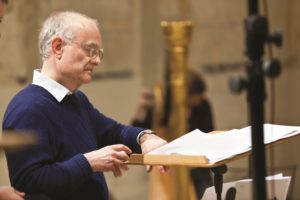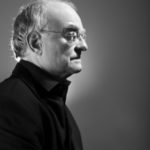By Cara Tasher, choral conductor and teacher
Cara Tasher: Yours is a household name in choral music, especially for American church musicians, and it is rare for a choral musician to be interviewed on the US television show Sixty Minutes and featured on the Today Show. Thank you for drawing the attention of mass media to choral music. Tell us something about you that might surprise your large fan base.
John Rutter: Perhaps that I have a more serious side – and (for some people at least) that I don’t only emerge, like Santa Claus, in December. It’s true that I have written some short choral pieces, and Christmas carols too, which have found favour among a far wider public internationally than I ever expected, but then, I enjoy writing tuneful and accessible music. The surprise might be the more substantial pieces such as the Hymn to the Creator of Light, or my early work, The Falcon – or, outside the choral sphere, my Partita for Orchestra or my Piano Concerto.

CT: How did you choose the text for the non-sacred works you have written?
JR: There’s no difference in my mind between choosing a sacred or a secular text – both need care. I keep a large collection of poetry books, and I live not far from the Cambridge University Library, so I browse until I find what I want. If I can’t find a text that says what I want it to say, I write my own text.
CT: Out of your many sacred works, which are the ones closest to your heart?
JR: I don’t believe in having favourite compositions – it would be like having a favourite among your own children. I just do my best with each and every piece I write, though obviously some work out better than others.
CT: As a composer who has written hundreds of works of varying lengths, instrumentations, and magnitude, who was published at the age of twenty-two, and who sang on the original War Requiem recording in 1963 under Britten himself, you have inspired many people. Who in the new generation should we be looking out for and why?
JR: Anyone who has imagination, vision, technique, determination, willingness to learn, and a huge capacity for hard work.
CT: For several years you suffered from chronic fatigue syndrome (ME). Great fatigue, perhaps not as serious as yours, but nonetheless an issue for many musicians, especially conductors, is not often spoken about. If it isn’t too difficult, please explain how you handled this, and even more importantly, how you emerged healthy and transformed?
JR: I did have ME – and I don’t recommend it to anyone. I tried to follow such little medical advice as was available in the 1980s (the condition is better understood nowadays). Looking back, I had seven pretty tough years, but I kept reminding myself that ME isn’t life-threatening, just debilitating, and that it’s finite. In the end it gave up and more or less went away.
CT: In your C Music TV interview, you speak of your close friendship with Sir John Tavener at Highgate School. Do you have any fun stories that you might allow yourself to share with the choral community?
JR: Nothing comical that I can recall – just a good feeling that we were both aspiring composers (John Tavener with a much clearer sense of purpose and direction than I had at the time) and that in those school years we were companions on a similar journey. The music he writes and the music I write are not at all alike, but I think we share many of the same values and goals.
CT: In an ever-technological world of people less appreciative of the formal arts and less able to focus attention for long spans of time, how do you see the future of choral music?
JR: Choral music isn’t going to go away any more than sex is. It’s a fundamental human impulse to sing together, and such a wonderful feeling that it is bound to survive, in one form or another. Take any period of choral history, and you will find good music and forgettable music. The good remains, the forgettable fades, and that’s what will surely happen to our choral music now.
CT: What are you currently working on that you are excited about?
JR: I’m always excited about everything I work on, but like many working musicians, I have to deal with short-term goals most of the time rather than thinking about long-term ones. This week, wearing my recording producer’s hat, I’m doing final sound edits of the wonderful Clare College Choir’s latest album for Harmonia Mundi. Cambridge has so many tremendous choirs and their recordings are heard worldwide, so that’s quite a responsibility. Next week, I wear my conductor’s hat and have to brush up on the Brahms Requiem, a work I can return to time and again and still find something new. In June, I shall be directing some Come and Sing days, which are open to all and a chance to broaden our choral community with a day’s fun singing. People show up in their hundreds for these occasions, so clearly there’s a demand for them. I will be putting my composer’s hat back on later in the year, with, I hope, a long-promised cello concerto, and doubtless some smaller choral pieces along the way. There’s always too much to do, and not enough time.
CT: Do you have a compositional things-to-do list of any kind, and if so, what is on it?
JR: An opera, a musical, one more larger choral work, some overdue pieces for various cherished performer colleagues…and perhaps a surprise…
 John Rutter was born in London in 1945 and received his first musical education as a chorister at Highgate School. He went on to study music at Clare College, Cambridge, where he wrote his first published compositions and conducted his first recording while still a student. His compositional career has embraced both large and small-scale choral works, orchestral and instrumental pieces, a piano concerto, two children’s operas, music for television, and specialist writing for such groups as the Philip Jones Brass Ensemble and the King’s Singers. His larger choral works, Gloria (1974), Requiem (1985), Magnificat (1990), Psalmfest (1993) and Mass of the Children (2003) have been performed many times in Britain, North America, and a growing number of other countries. He co-edited four volumes in the Carols for Choirs series with Sir David Willcocks, and, more recently, has edited the first two volumes in the new Oxford Choral Classics series, Opera Choruses (1995) and European Sacred Music (1996). From 1975 to 1979 he was Director of Music at Clare College, whose choir he directed in a number of broadcasts and recordings. After giving up the Clare post to allow more time for composition, he formed the Cambridge Singers as a professional chamber choir primarily dedicated to recording, and he now divides his time between composition and conducting. He has guest-conducted or lectured at many concert halls, universities, churches, music festivals, and conferences in Europe, Africa, North and Central America and Australasia. In 1980 he was made an honorary Fellow of Westminster Choir College, Princeton, and in 1988 a Fellow of the Guild of Church Musicians. In 1996 the Archbishop of Canterbury conferred a Lambeth Doctorate of Music upon him in recognition of his contribution to church music. He was honoured in the 2007 Queen’s New Year Honours List, being awarded a CBE for services to music. John Rutter’s music is published by Oxford University Press, Hinshaw Music Inc. and Collegium Music Publications. To find more information, visit: www.johnrutter.com.
John Rutter was born in London in 1945 and received his first musical education as a chorister at Highgate School. He went on to study music at Clare College, Cambridge, where he wrote his first published compositions and conducted his first recording while still a student. His compositional career has embraced both large and small-scale choral works, orchestral and instrumental pieces, a piano concerto, two children’s operas, music for television, and specialist writing for such groups as the Philip Jones Brass Ensemble and the King’s Singers. His larger choral works, Gloria (1974), Requiem (1985), Magnificat (1990), Psalmfest (1993) and Mass of the Children (2003) have been performed many times in Britain, North America, and a growing number of other countries. He co-edited four volumes in the Carols for Choirs series with Sir David Willcocks, and, more recently, has edited the first two volumes in the new Oxford Choral Classics series, Opera Choruses (1995) and European Sacred Music (1996). From 1975 to 1979 he was Director of Music at Clare College, whose choir he directed in a number of broadcasts and recordings. After giving up the Clare post to allow more time for composition, he formed the Cambridge Singers as a professional chamber choir primarily dedicated to recording, and he now divides his time between composition and conducting. He has guest-conducted or lectured at many concert halls, universities, churches, music festivals, and conferences in Europe, Africa, North and Central America and Australasia. In 1980 he was made an honorary Fellow of Westminster Choir College, Princeton, and in 1988 a Fellow of the Guild of Church Musicians. In 1996 the Archbishop of Canterbury conferred a Lambeth Doctorate of Music upon him in recognition of his contribution to church music. He was honoured in the 2007 Queen’s New Year Honours List, being awarded a CBE for services to music. John Rutter’s music is published by Oxford University Press, Hinshaw Music Inc. and Collegium Music Publications. To find more information, visit: www.johnrutter.com.
Edited by Jennifer Callaghan, UK

